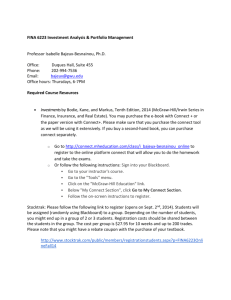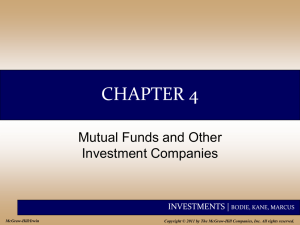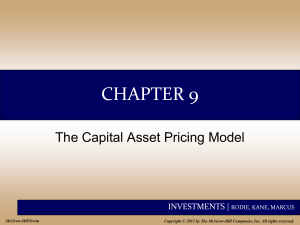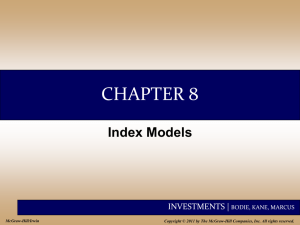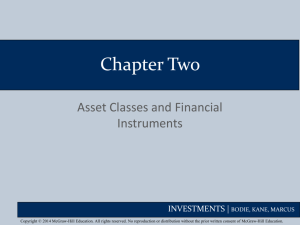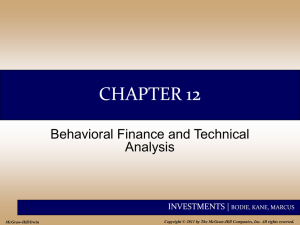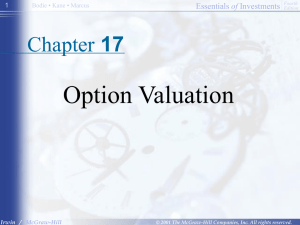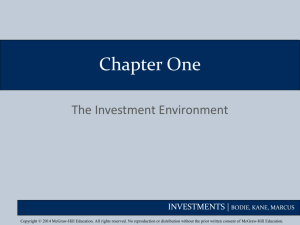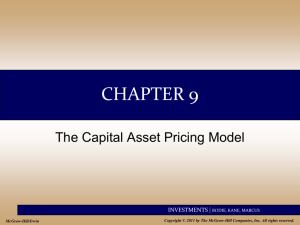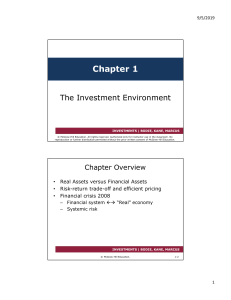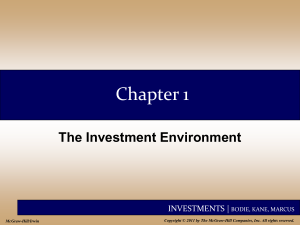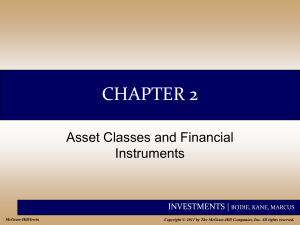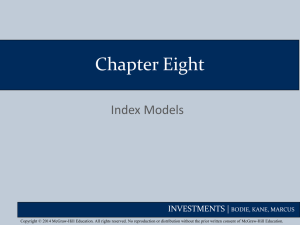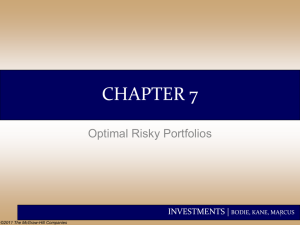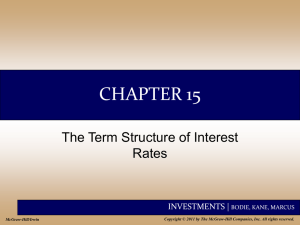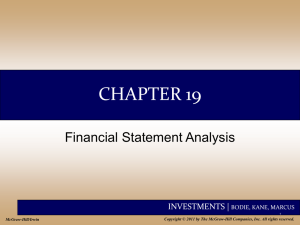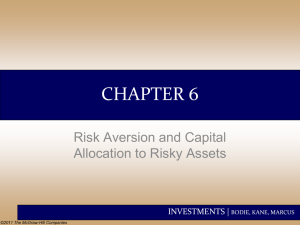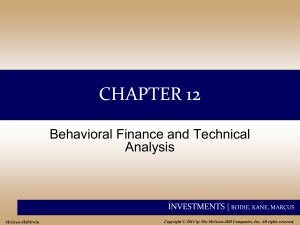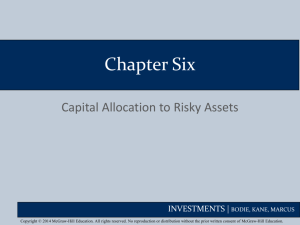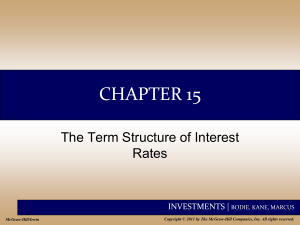Stock
advertisement
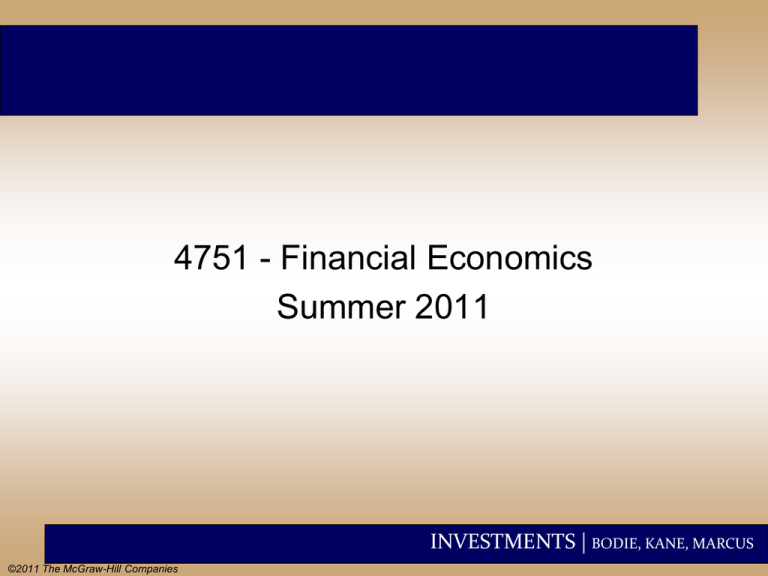
4751 - Financial Economics Summer 2011 INVESTMENTS | BODIE, KANE, MARCUS ©2011 The McGraw-Hill Companies 4751 - Financial Economics • My Name: Rene Schwengber • Today: – Syllabus – Introduction • BKM chapter 1 INVESTMENTS | BODIE, KANE, MARCUS ©2011 The McGraw-Hill Companies Syllabus • Grade from 3 sources (each worth 1/3) • average homework • First exam (July 1st, in class) • Second exam (July 22nd, in class) • Homework’s typed and stapled • otherwise cap maximum grade at 75% • I will not accept emailed homeworks. • If you can’t submit homework in due date in class, talk to me first. INVESTMENTS | BODIE, KANE, MARCUS ©2011 The McGraw-Hill Companies Webpage and other content • Our webpage is http:www.econ.umn.edu/~schwe227 (click on teaching) • Our required book is BKM. – We will also use other books for content that required more depth. INVESTMENTS | BODIE, KANE, MARCUS ©2011 The McGraw-Hill Companies Other • Office Hours: – TBA, and by appointment. INVESTMENTS | BODIE, KANE, MARCUS ©2011 The McGraw-Hill Companies Intro • Investment (noun) current commitment of money or other resources in the expectation of reaping future benefits – Intertemporal allocation of resources • Time (for “risk-free” investments) • Uncertainty (Risky) • Examples of risky investment? – (list examples) • Example of risk-free investment? – (list examples) INVESTMENTS | BODIE, KANE, MARCUS ©2011 The McGraw-Hill Companies Real Assets Versus Financial Assets • Real Assets >____________< – Examples: Land, buildings, machines, knowledge used to produce goods and services • Financial Assets >____________< INVESTMENTS | BODIE, KANE, MARCUS ©2011 The McGraw-Hill Companies Financial Assets • Three types: 1. Fixed income or debt >____________< 2. Common stock or equity >____________< 3. Derivative securities >____________< INVESTMENTS | BODIE, KANE, MARCUS ©2011 The McGraw-Hill Companies Financial Assets vs. Real Assets polling • Which type of assets do you think is most important in an economy? • Real assets. • How important do you think financial assets are in a modern well functioning economy? – Very ______ Not that much ______ INVESTMENTS | BODIE, KANE, MARCUS ©2011 The McGraw-Hill Companies Class vote • How important financial assets are in a modern well functioning economy? ____ “Very” vs. ____ “Not that much” Let’s hear this 4minutes clip. http://hhei.umn.edu/videos/video3.html • • • About in 3’40’’ to 5’30” INVESTMENTS | BODIE, KANE, MARCUS ©2011 The McGraw-Hill Companies Example: Dutch East India Company • As mentioned in the video. Financial assets are important in a well functioning economy since they provide some means on how to best allocate resources at any given time. • Consider the Dutch East India Company example. – Chartered company – Founded in 17th century defunct almost in 19th century – Fist company to issue Stock (financial asset) INVESTMENTS | BODIE, KANE, MARCUS ©2011 The McGraw-Hill Companies Example: Dutch East India Company • • • • Consider the Dutch East India Company What is a stock? Stock or equity is a claim of ownership on a firm. Payoff of exploration was potentially very big (high gains) but so was its risk (e.g. loss ship) • Idea: Spread risk by financing more than one expedition at once. • Many claim this was one of the major force behind the Dutch growth in maritime power in that period (and believe, the growth and power of this mega-coroporation was every big) INVESTMENTS | BODIE, KANE, MARCUS ©2011 The McGraw-Hill Companies Investment Example • The goal of investing in simple: – Maximize (today and future) utility while allocating current resources into real and financial assets. • Assume agents value streams of daily consumption. – (c1, c2, c3, c4) (a vector) gives Utility U(c1, c2, c3, c4) (a number) • E.g.: Stream 1: (1,1,1,97) vs. Stream 2 (25,25,25,25) – Which would you rank higher? • Most would prefer the 2nd stream of consumption • This type of question is studied under the label “Theory of Choice (under uncertainty)”. We will spend some time talking about it INVESTMENTS | BODIE, KANE, MARCUS ©2011 The McGraw-Hill Companies Financial Markets and the Economy • Information Role: >____________< • Consumption Timing: >____________< INVESTMENTS | BODIE, KANE, MARCUS ©2011 The McGraw-Hill Companies Financial Markets and the Economy (Ctd.) • Allocation of Risk: >____________< • Separation of Ownership and Management: >____________< INVESTMENTS | BODIE, KANE, MARCUS ©2011 The McGraw-Hill Companies General problem • A well-developed economy with financial markets provides: – intertemporal allocation of resources – Insurance • against bad shocks • decreasing volatility • You can think of a financial assets as the means of decreasing the friction on resource allocation in the economy INVESTMENTS | BODIE, KANE, MARCUS ©2011 The McGraw-Hill Companies The Investment Process • Asset allocation – Choice among broad asset classes • Security selection – Choice of which securities to hold within asset class – Security analysis to value securities and determine investment attractiveness INVESTMENTS | BODIE, KANE, MARCUS ©2011 The McGraw-Hill Companies Markets are Competitive • Risk-Return Trade-Off – The will always be risk associated to investments. INVESTMENTS | BODIE, KANE, MARCUS ©2011 The McGraw-Hill Companies Markets are Competitive (Ctd.) • Efficient Markets – Passive Management • No attempt to find undervalued securities • No attempt to time the market • Holding a highly diversified portfolio – Active Management • Finding mispriced securities • Timing the market INVESTMENTS | BODIE, KANE, MARCUS ©2011 The McGraw-Hill Companies Last Announcement • Read Chapter 1 from BKM (focus on 1.1 to 1.5) • Read Chapter 2 of Theory of Value (link in class webpage) • We will review basic concepts from basic probability theory. • What time Office Hours works for most? INVESTMENTS | BODIE, KANE, MARCUS ©2011 The McGraw-Hill Companies
